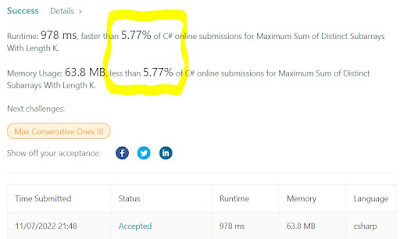Sliding Window Technique - Part 7
There is usually one caveat on sliding window approaches: usually after the main loop, you still need to make one extra check for the very last case. Treat it as a corner case, albeit critical for the correctness of the code. Talking about this line here. Code is down below, cheers, ACC.
2461. Maximum Sum of Distinct Subarrays With Length K
Medium
You are given an integer array nums and an integer k. Find the maximum subarray sum of all the subarrays of nums that meet the following conditions:
- The length of the subarray is
k, and - All the elements of the subarray are distinct.
Return the maximum subarray sum of all the subarrays that meet the conditions. If no subarray meets the conditions, return 0.
A subarray is a contiguous non-empty sequence of elements within an array.
Example 1:
Input: nums = [1,5,4,2,9,9,9], k = 3 Output: 15 Explanation: The subarrays of nums with length 3 are: - [1,5,4] which meets the requirements and has a sum of 10. - [5,4,2] which meets the requirements and has a sum of 11. - [4,2,9] which meets the requirements and has a sum of 15. - [2,9,9] which does not meet the requirements because the element 9 is repeated. - [9,9,9] which does not meet the requirements because the element 9 is repeated. We return 15 because it is the maximum subarray sum of all the subarrays that meet the conditions
Example 2:
Input: nums = [4,4,4], k = 3 Output: 0 Explanation: The subarrays of nums with length 3 are: - [4,4,4] which does not meet the requirements because the element 4 is repeated. We return 0 because no subarrays meet the conditions.
Constraints:
1 <= k <= nums.length <= 1051 <= nums[i] <= 105
Accepted
14,455
Submissions
44,090
public long MaximumSubarraySum(int[] nums, int k)
{
//Sliding window approach
long maxSum = 0;
long currentSum = 0;
Hashtable uniqueElements = new Hashtable();
for (int i = 0; i < nums.Length; i++)
{
if (i < k)
{
if (!uniqueElements.ContainsKey(nums[i]))
uniqueElements.Add(nums[i], 0);
uniqueElements[nums[i]] = (int)uniqueElements[nums[i]] + 1;
currentSum += nums[i];
}
else
{
maxSum = (uniqueElements.Count == k && currentSum >= maxSum) ? currentSum : maxSum;
int firstVal = nums[i - k];
if (uniqueElements.ContainsKey(firstVal))
{
uniqueElements[firstVal] = (int)uniqueElements[firstVal] - 1;
if ((int)uniqueElements[firstVal] <= 0)
uniqueElements.Remove(firstVal);
currentSum -= firstVal;
}
if (!uniqueElements.ContainsKey(nums[i]))
uniqueElements.Add(nums[i], 0);
uniqueElements[nums[i]] = (int)uniqueElements[nums[i]] + 1;
currentSum += nums[i];
}
}
//Last, corner case
maxSum = (uniqueElements.Count == k && currentSum >= maxSum) ? currentSum : maxSum;
return maxSum;
}




Comments
Post a Comment